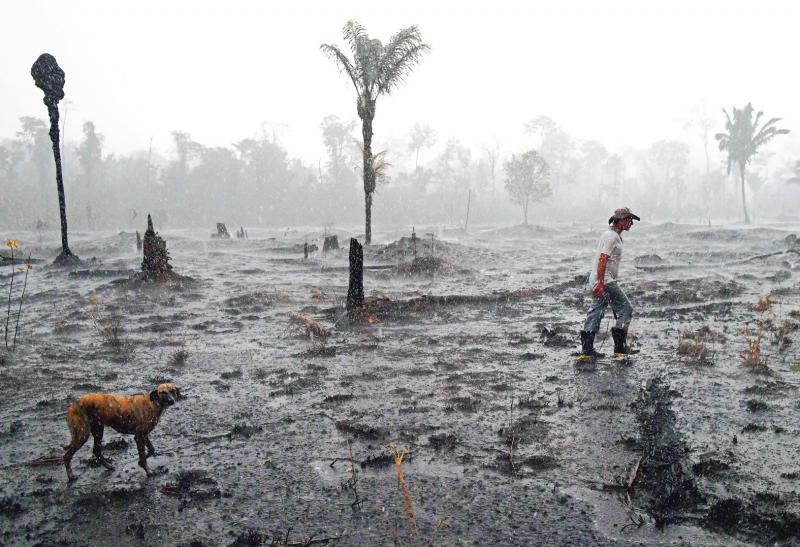Faced with investors demanding “results” in the fight against Amazon deforestation, the Brazilian government seems to be performing something of an about-face, although it would have to work to convince skeptics.
The simple fact that Brazilian Vice President Hamilton Mourao on Wednesday committed to cutting deforestation and forest fires “to an acceptable minimum” was a mini-revolution in the administration of far right Brazilian President Jair Bolsonaro.
“Europe is an environmental cult,” Bolsonaro said on Thursday on Facebook. “They haven’t preserved their environment, almost nothing ... but they hit us all the time over this, and unfairly.”

Photo: AFP
“We have problems, because Brazil is an agribusiness power,” he added.
However, at the end of last month, investment funds from Europe, Asia and South America that collectively administer close to US$4 trillion in assets cranked up the pressure in an open letter to Bolsonaro, urging the end of projects that threaten to accelerate destruction of the world’s largest rainforest.
That seems to have hit home.
“The fact that the pressure comes from investors and not from heads of state, that gives it a different tone,” Andre Perfeito, an economist at Necton consultants, told reporters.
Last week, those investors held a video conference with the Brazilian government, after which Mourao said that words were not enough.
“At no time did investors commit with resources, they want to see results ... to do with the reduction in deforestation,” said Mourao, who heads the Brazilian National Amazon Council.
The threat from foreign investors is taken very seriously by a government that needs capital to reignite an economy ravaged by the COVID-19 pandemic.
“Brazil is banking on foreign investments to emerge from the crisis. These foreign investments are important for a number of areas: sanitation, infrastructure,” said Rubens Barbosa, former Brazilian ambassador to the US, and now director of an international relations and foreign trade institute.
Several former finance ministers and ex-presidents of Brazil’s central bank said in an open letter this week that failure to take action against climate change “could have much more serious consequences than the pandemic.”
Environmental campaigners are not holding their breath though, given the Brazilian government’s history of wanting to remove protections afforded to indigenous land and natural reserves to help expand mining and farming.
“What is the goal? It doesn’t exist. What is the budget? It doesn’t exist... What is the method? It doesn’t exist. There’s no change in conduct that gives us the minimum hope that the government will change its behavior,” said Marcio Astrini, executive secretary of the Climate Observatory, a collective of non-governmental organizations fighting against global warming.
Brazilian Minister of Agriculture Tereza Cristina has said that Brazil does not need to deforest the Amazon to develop its huge agricultural potential.
Cristina, an ardent supporter of Brazil’s agribusinesses, knows that her sector depends on exports to countries increasingly reticent about buying products from deforested land.

China’s military yesterday showed off its machine-gun equipped robot battle “dogs” at the start of its biggest ever drills with Cambodian forces. More than 2,000 troops, including 760 Chinese military personnel, are taking part in the drills at a remote training center in central Kampong Chhnang Province and at sea off Preah Sihanouk Province. The 15-day exercise, dubbed Golden Dragon, also involves 14 warships — three from China — two helicopters and 69 armored vehicles and tanks, and includes live-fire, anti-terrorism and humanitarian rescue drills. The hardware on show included the so-called “robodogs” — remote-controlled four-legged robots with automatic rifles mounted on their

A Philippine boat convoy bearing supplies for Filipino fishers yesterday said that it was headed back to port, ditching plans to sail to a reef off the Southeast Asian country after one of their boats was “constantly shadowed” by a Chinese vessel. The Atin Ito (“This Is Ours”) coalition convoy on Wednesday set sail to distribute fuel and food to fishers and assert Philippine rights in the disputed South China Sea. “They will now proceed to the Subic fish port to mark the end of their successful mission,” the group said in a statement. A Philippine Coast Guard vessel escorting the convoy was

STREET WATCH: Residents watched over barricades blocking roads and flew white flags to show that they intended to keep an eye on their neighborhoods France yesterday deployed troops to New Caledonia’s ports and international airport, banned TikTok and imposed a state of emergency after three nights of clashes that have left four dead and hundreds wounded. Pro-independence, largely indigenous protests against a French plan to impose new voting rules on its Pacific archipelago have spiraled into the deadliest violence since the 1980s, with a police officer among several killed by gunfire. On roads, the torched detritus amassed over four days of unrest was scattered amid fist-size hunks of rock and cement that appeared to have been flung during riots. Armored vehicles roved the city’s palm-lined boulevards, usually

The last piece of privately owned land in the strategic Svalbard archipelago in the arctic is up for grabs, a property likely to entice China, but which Norway does not intend to let go without a fight. The archipelago is located halfway between mainland Norway and the North Pole, in an arctic region that has become a geopolitical and economic hotspot, as the ice melts and relations grow ever frostier between Russia and the West. For 300 million euros (US$326 million), interested parties can acquire the remote Sore Fagerfjord property in southwestern Svalbard. Measuring 60km2 — about the size of Manhattan — the